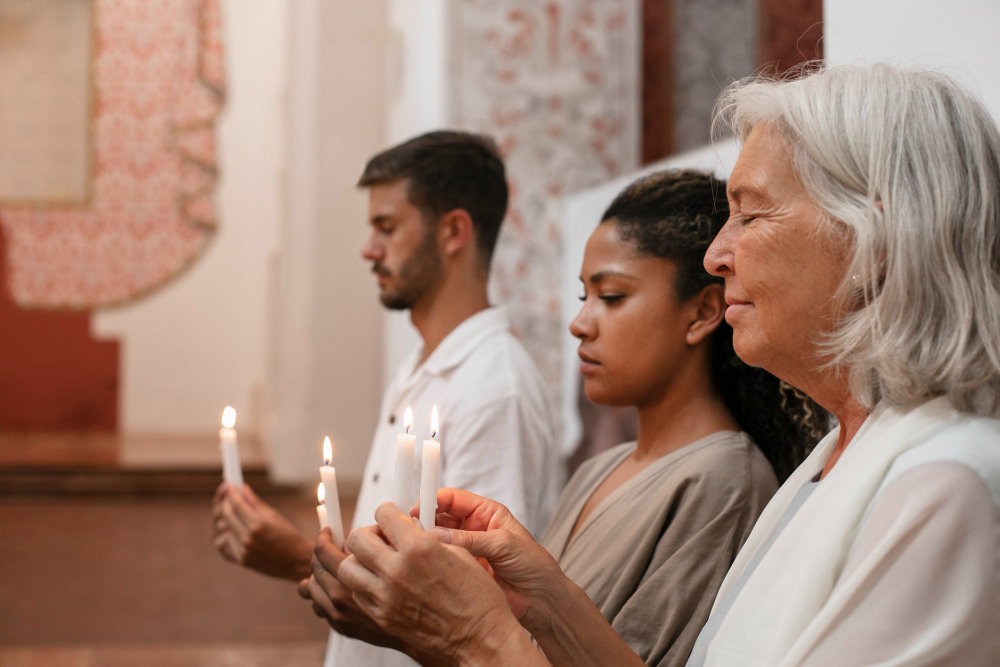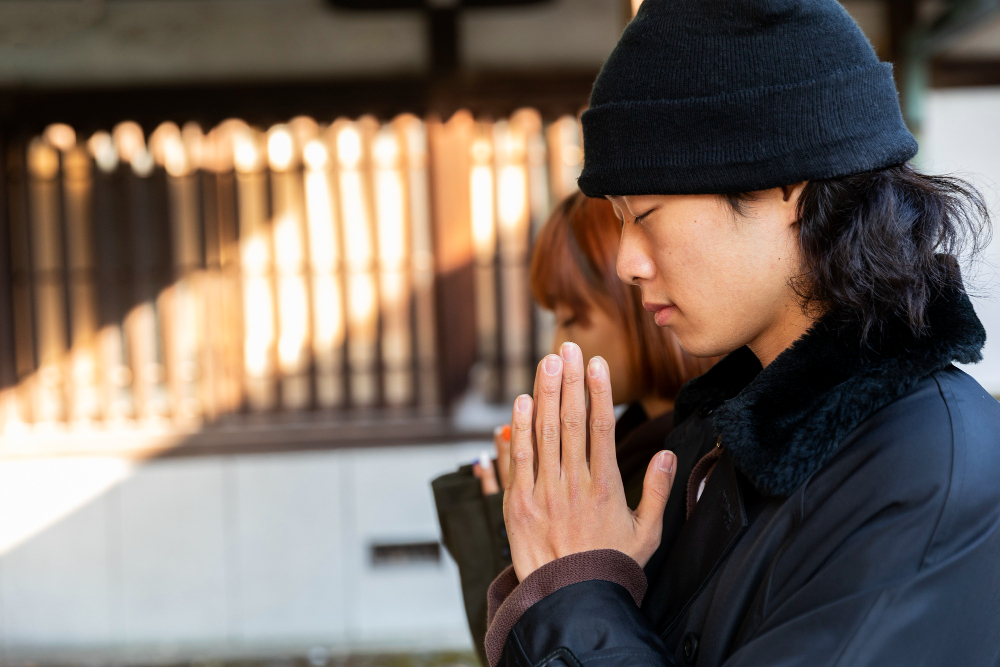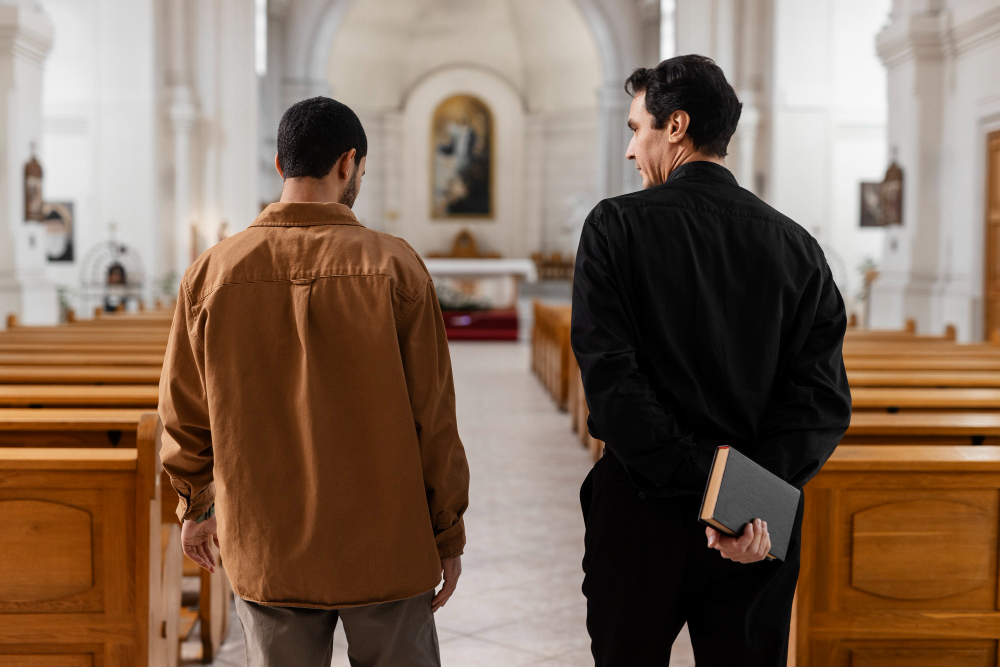These thought-provoking questions challenge the core of religious beliefs—are you prepared to confront them head-on?

Think your faith can handle a challenge? Atheists pose some hard-hitting questions that even the most devout believers find unsettling. These aren’t the surface-level debates you’ve heard in Sunday school or philosophy class. These are deep, raw inquiries that go right to the heart of what we claim to know about divinity, morality, justice, and the very nature of existence.
Whether you’re a person of faith, agnostic, or simply someone who enjoys questioning big ideas, these thought-provoking questions will press you to examine your beliefs in a new light. Some may leave you with more questions than answers. Others may deepen your convictions. But either way, confronting these challenges could transform the way you see religion—and maybe even the world itself.
1. Why Does an All-Powerful God Allow So Much Suffering?

If God is truly omnipotent and filled with unconditional love, then why does unimaginable suffering persist throughout the world? From starving children and devastating wars to terminal illness and natural disasters, it often seems like pain targets the innocent. Believers have long suggested that suffering serves to test faith, refine character, or preserve free will, as stated by Jonathan Romain at The Guardian. But those explanations falter when applied to horrific tragedies that serve no apparent purpose, especially those involving victims with no agency.
How do we reconcile an all-powerful deity with a world where injustice and cruelty appear unrestrained? Many theologians point to a larger divine plan or the mystery of God’s will, yet that too feels unsatisfying when faced with daily heartbreak. If a human had the power to stop a brutal act and didn’t, we’d call it immoral. So why does God get a pass? Grappling with this question forces us to evaluate whether our concept of God aligns with the realities of the world we see.
2. If God Created Everything, Who Created God?

This question hits at the paradox of first cause. The standard religious argument is that everything in existence has a beginning—and thus must have a creator. But if that’s true, who or what created God? Many believers respond by saying God exists outside of time and space, meaning He is eternal and uncreated, as mentioned by writers at American Atheists. While that might sound theologically satisfying, it introduces a loophole that contradicts the original logic: everything has a cause—except God.
Atheists often argue that this special exception is intellectually inconsistent. Why stop the chain of cause and effect with God instead of with the universe itself? If complexity demands a creator, then isn’t God—who is presumably the most complex being of all—even more in need of one? This question doesn’t just challenge divine origin; it calls into question the consistency and logic of religious reasoning altogether.
3. Why Are There So Many Contradictions in Religious Texts?

If a text is truly inspired by a perfect divine being, it should be internally consistent and universally clear. Yet, sacred scriptures across all major religions are filled with contradictions, ambiguous metaphors, and conflicting accounts. One verse might preach forgiveness, while another endorses vengeance. Some parts celebrate peace; others glorify violence. These inconsistencies fuel debate not only between religions but even within the same faith traditions, as per Gary Alan Taylor at The Sophia Society.
Believers often defend these discrepancies as a result of historical context, metaphorical intention, or imperfect translations. But if salvation and morality hinge on these texts, shouldn’t their meaning be unmistakable? If God wanted to guide humanity through a holy book, wouldn’t He ensure its clarity stood the test of time, culture, and language? Instead, we’re left with volumes that require constant interpretation—sometimes to justify wildly opposing actions.
4. Why Do Bad People Prosper While Good People Suffer?

Religious teachings often promise that virtue will be rewarded and wrongdoing punished—if not in this life, then in the next. But what we observe paints a different picture. Greedy, dishonest individuals often rise to positions of wealth and influence, while kind and moral people struggle with hardship. If a just and loving God oversees the world, why does it seem so random and unfair in practice?
Some argue that divine justice isn’t about this life but the afterlife, where everything will be made right. But for many, that answer rings hollow. It’s a deferral of justice, not an explanation for its absence. Does it really make sense that a child who dies from disease or war might only find justice after death? If God truly cares about righteousness, wouldn’t we see more evidence of it in the everyday lives of people trying to do good?
5. If God Knows Everything, How Is Free Will Real?

The concept of free will is central to many religious traditions—it’s the reason humans can choose between good and evil, sin or salvation. But if God already knows every choice you will ever make, then is that choice truly yours? If an outcome is foreseen and unchangeable, can we honestly say it’s freely made? The very definition of freedom seems to collapse under the weight of divine omniscience.
Some believers argue that foreknowledge doesn’t equal predestination—that knowing what will happen isn’t the same as causing it. But think about it: if God knows with certainty that you will commit a specific action tomorrow, how could you possibly do otherwise? This question undermines the notion of accountability. If your path is known in advance, can you be blamed—or rewarded—for following it?
6. Why Would a Loving God Send People to Hell?

Eternal damnation is one of the most terrifying aspects of many religions. The idea that a loving, merciful God would sentence His creations to endless torment for finite sins raises troubling questions. If love is patient, forgiving, and compassionate—as many religious texts claim—how does that reconcile with the concept of hell?
Some defend hell as a consequence of human choice, saying God doesn’t send people there; they choose it by rejecting Him. But what about those born into other faiths, or people who never had a meaningful opportunity to believe? Is eternal suffering a fair punishment for ignorance or doubt? The notion of hell feels more like a relic of fear-based control than an expression of divine justice or love.
7. Why Hasn’t God Healed Amputees?

Miracle stories abound—cancer disappearing, injuries vanishing, prayers answered against all odds. But when it comes to clear, observable miracles, one example remains suspiciously absent: the regrowth of lost limbs. If God can cure the blind or cleanse disease, why hasn’t a single verified instance of a regrown arm or leg occurred?
Believers often say God works in mysterious ways, or that miracles serve a spiritual rather than physical purpose. But that explanation doesn’t hold up under scrutiny. Healing a missing limb would be the most verifiable, undeniable miracle—yet it never happens. The absence of such events leads skeptics to conclude that what people call miracles are either coincidences or placebo effects—not divine intervention.
8. Why Did God Wait So Long to Send His Message?

The universe is over 13 billion years old. Humanity has existed for at least 200,000 years. Yet most major religions emerged only within the last few thousand. That leaves a vast stretch of time during which billions of humans lived and died without access to divine guidance or salvation. Why would a loving God delay His most important messages for so long?
If God wants a relationship with His creations, why not reach out sooner—or continuously, across cultures and time? Why appear to just one group in one location and expect the entire world to accept it as truth? The delayed revelation raises serious questions about fairness, accessibility, and whether religious teachings are truly divine or simply man-made stories that emerged alongside civilization.
9. Why Are There Thousands of Religions If Only One Is True?

If there is one true God and one correct path to spiritual truth, then why do so many different belief systems exist? From Hinduism and Islam to Christianity and indigenous animism, people across the globe are raised with entirely different understandings of the divine. Can they all be wrong except for one?
Some suggest that other religions are distortions of the truth, but that implies God allowed immense confusion to flourish. Why would a loving creator allow millions—if not billions—of people to follow the “wrong” religion simply because of where or when they were born? The variety of belief systems suggests either that truth is more relative than we think, or that all religions are human attempts to understand something beyond our grasp.
10. Why Doesn’t Prayer Work Consistently?

Millions of people pray every day—begging for healing, peace, success, or guidance. Sometimes those prayers seem to work; other times, they go unanswered. Believers interpret answered prayers as divine affirmation and unanswered ones as “God’s plan.” But this creates a moving goalpost that’s impossible to verify.
If prayer had real, measurable effects, we’d expect to see statistically significant outcomes. But studies often show prayer performs no better than chance. It’s emotionally comforting, yes—but does it actually change outcomes? If God is all-powerful and attentive, why would He ignore sincere requests for help, healing, or mercy—especially when a simple “yes” could transform a life?
11. Why Do So Many Religious Beliefs Reflect Cultural Bias?

Religious teachings often mirror the norms, fears, and values of the societies that birthed them. Ancient rules about clothing, diet, marriage, and gender roles were shaped more by the culture than by any universal truth. If divine teachings were timeless and universal, why do they align so neatly with outdated societal norms?
Consider how religion views women, sexuality, or morality across different cultures. Often, these views aren’t just inconsistent—they’re contradictory. This suggests that religion might be a reflection of human societies trying to codify behavior, rather than an eternal blueprint passed down from a higher being. If God’s word is supposed to be above human error, why does it so often look like a human product?
12. Why Do Religious Morals Change Over Time?

What was once condemned by religion is now celebrated—or at least accepted—by many believers. Think about issues like slavery, women’s rights, and interracial marriage. All were once opposed on religious grounds but are now embraced or tolerated. If morality is dictated by an unchanging God, then why does it evolve?
Some argue that human interpretation has matured. But if our understanding shapes morality more than divine command, what does that say about the source of moral truth? If people must “update” God’s teachings to match modern values, then aren’t we admitting that human reason—not divine instruction—is the true moral compass?
13. Why Are Religious Teachings So Often Used to Justify Hate?

From the Crusades and the Inquisition to modern-day terrorism and bigotry, religion has been invoked time and again to justify horrific acts. Even today, people cite sacred texts to discriminate against LGBTQ+ individuals, suppress women, or incite violence. If religion is supposed to be about love, peace, and compassion, why does it so easily lend itself to hate?
Some say the problem lies with people, not religion—that scriptures are misinterpreted by those with bad intentions. But shouldn’t a divine message be unmistakably clear? If holy texts can be weaponized so effectively, perhaps they aren’t as sacred—or as divinely inspired—as we’d like to believe. At what point do we question the message, not just the messenger?
14. Why Doesn’t God Make His Existence Undeniable?

If God truly wants humanity to believe in Him, then why remain so hidden? A being capable of creating galaxies surely has the means to make His presence universally known. Instead, we rely on ancient texts, personal testimonies, and miracles that often resemble coincidence. Wouldn’t it make more sense for a loving God to eliminate doubt and confusion by simply showing up?
Some say faith matters more than proof. But if the stakes are eternal—heaven or hell—shouldn’t we be given more than hearsay? Should belief really hinge on where you’re born, who raises you, or how much you’re willing to suppress skepticism? If God is real and loves us, why make it so easy to doubt?
